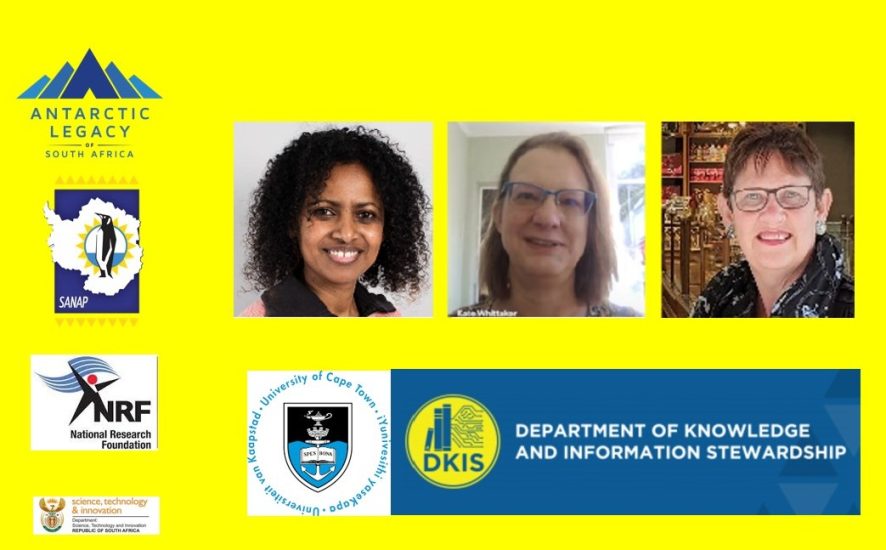The University of Cape Town (UCT) recently hosted a career panel for students completing their Post Graduate Diploma in Library and Information Studies (PGDipLIS) on 4 September 2025. Among the three panelists was Ria Olivier, Principal Investigator at the Antarctic Legacy of South Africa (ALSA), who shared her experiences and insights alongside colleagues from related fields, offering students a glimpse into the skills, lessons, and opportunities that shape successful careers in information and archival work.
Meet the panelists:
Awot Gebregziabher, Senior Librarian for Science & Engineering, UCT
Kate Whittaker, Digital Learning Consultant and Web Accessibility Tester
Ria Olivier, Principal Investigator, Project Manager and Digital Archivist, Antarctic Legacy of South Africa
The session began with each panellist reflecting on their career journeys and introducing the organisations they currently work with. From there, the discussion turned to the skills required in their day-to-day roles
Core skills that stand the test of time
Awot noted that rather than simply doing what is required, one should “go above and beyond”, taking pride in delivering their best effort. This not only benefits colleagues and users but also brings a sense of personal satisfaction, a point that drew nods of agreement from the audience. She highlighted that to avoid stagnation, it is essential to keep inspiration alive and look for opportunities to make work more efficient. One strategy is tackling a task the hard way first, to fully grasp it, and then finding ways to streamline the process. Over time, this creates a smoother and more sustainable workflow.
Ria said, “the core principles I learned through my library and information science studies remain relevant decades later”. Whether managing budgets, curating collections, or writing proposals and grants, those fundamentals still guide her work. She noted that even as technology and terminology evolve, the basics of cataloguing, curation, and user studies continue to apply. Ria explained how her background in user studies directly shaped the design of both the ALSA and SANAP websites, since “you need to understand your audience’s needs”. To illustrate the lasting value of those fundamentals, Ria shared a light-hearted moment: once, when she needed information for her work, she remembered jotting it down as a student. After digging through an old box, she found her notes on yellowing pages, a story that drew laughter from the students in the room.
Kate described how abstract thinking and adaptability have been key throughout her career. She may have started with cataloguing skills but soon discovered that “cataloguing becomes metadata, and metadata becomes SEO (search engine optimisation).” She explained how systems thinking supported her early work in secretary roles, giving her a strong grasp of databases and information structures.
Her expertise in metadata also helps her assign precise keywords to publications, ensuring they are findable and discoverable, even when working with multiple titles on very similar topics.
Kate’s current role focuses on digital accessibility, where her priority is making sure information can be accessed by a wide range of users, including people with disabilities, older users who may struggle with devices, and communities in rural areas with limited tech experience.
What panelists wished they’d known as students
Ria wished she had discovered the Myers-Briggs personality test earlier, as it revealed her motivations and what truly energised her. “For me, I love information. I want to know about everything!” she said. She advised students to pursue opportunities that bring genuine satisfaction, while also recognising their own limits: “Know what you can do and what you can’t do.” She encouraged students to seize opportunities for further study, noting that while a doctorate may not necessarily make you better at your job, it can enhance credibility, influence how others perceive you, and set you apart.
Awot reflected that she could have sought help in the library much earlier in her studies. She recalled thinking as a student that librarians were “just there to sit behind the counter,” a comment that drew laughter from the students. She encouraged them not to hold back, noting that speaking to librarians and using available resources can make a real difference in academic success.
Looking back on her studies, Kate said she wished she had trusted more in the idea that “there is something out there”, a career where she could contribute in a meaningful and passionate way. Her advice to students was to never hesitate to ask questions, as many of the opportunities that came her way arose simply from being curious and open to engaging with others.
Panelists’ advice to students entering the workforce
The panel closed with practical career advice. Ria said, “Keep your social media profiles professional as employers will definitely have a look.” She also encouraged students to prepare a clear CV, show passion in their work, and prioritise networking and visibility. Awot highlighted the value of volunteering, noting that it demonstrates initiative, builds experience, and provides valuable references. Kate encouraged students to trust their instincts, stay open to opportunities, and above all, believe in themselves as they build a meaningful career.
Closing reflections
This career panel reminded students that while career paths are rarely linear, core skills, curiosity, and passion remain timeless guides.
For ALSA, Ria’s participation was also a chance to show how the skills taught in library and information science extend far beyond traditional roles, even as far as preserving and sharing South Africa’s Antarctic heritage.
ALSA thanks Dr Safia Lagerdien and Dr Theresa de Young from the Department of Knowledge and Information Stewardship at UCT for this opportunity.
Text : Dana Jellin – Assistant Digital Archivist

